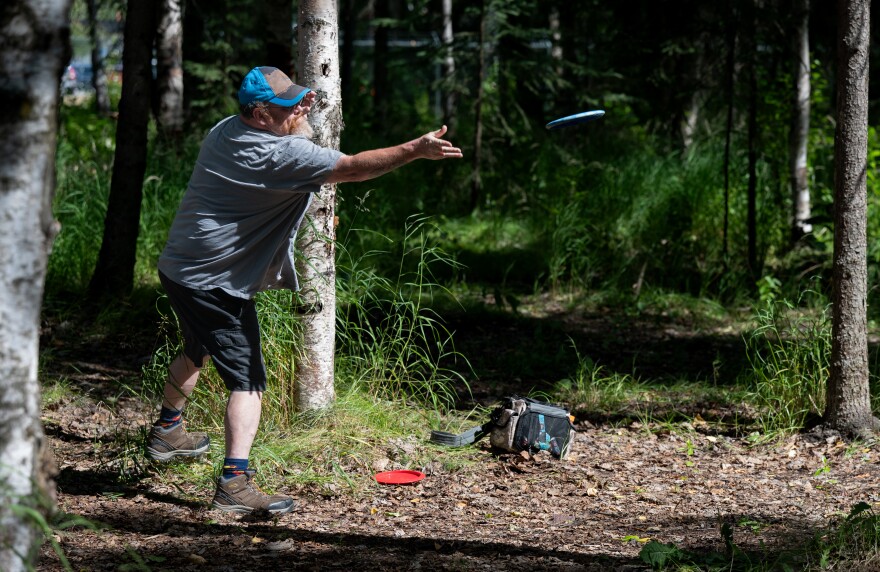This summer, Anchorage officials ordered the clearing of the city’s two biggest homeless camps, both in Mountain View. Six weeks later some question whether the neighborhood is any better off.
At one time, an estimated 100 to 200 people lived in Davis Park and the adjoining snow dump. Then, in June, the city cleared them out. For weeks afterward, municipal workers and contractors cleaned up the area, eventually removing more than 370 tons of trash, according to the city.
Now, nobody lives in the former camps. And while some Mountain View residents said they’re still seeing the camps’ residents hanging around, their access to the park has improved.
Eric Byron and his son Kyle were finishing up a round of disc golf with a friend on a recent afternoon in Davis Park.
They live right down the road and used to play in the wooded corner of Mountain View two or three times a week. They stopped coming a couple years ago, when more and more homeless people moved into the park.
Eric Byron said they didn’t feel safe: There were needles on the ground and people drinking and doing drugs.
“I pay my taxes, you know, I vote. I do everything I'm supposed to do,” he said. “Why can't I have a disc golf course to go to that's not gonna give me hepatitis or AIDS or get shot or robbed? We're in Anchorage, not South LA.”

Now, though, people like the Byrons are returning to the park. There are dog walkers and cricket players. On a recent sunny day, a couple strolled through the woods hand in hand. Another couple struggled to get a kite up in the air.
But the situation is complicated.
When the city cleared the camps, and in the days beforehand, 50 people went into shelter. Others went to stay with family members. But a lot are still sleeping outside, many of them nearby. And next door, Lions Park — once bustling with kids and baseball and basketball players — has become a hangout spot for some who used to live in the encampments. Others are spending time in alleys and on the streets of the neighborhood.

There is a lot more loitering happening around Mountain View since the camps were cleared out, said Anchorage Police Lt. Brian Fuchs. He said he has gotten calls from people in Mountain View who feel unsafe.
“There's not that much going on in Davis Park proper,” he said. “But some of the surrounding areas are a little bit of a concern for us, and we want to make sure that we're giving the proper attention to those areas.”
Police always have an eye out for drug use and other criminal activity, Fuchs said. But it’s totally legal for unhoused people to hang out on streets and in alleys, he said, since Anchorage doesn’t have any loitering laws.
“The hard part is with folks that are living in the areas. They see people walking in the neighborhood, and that concerns them,” Fuchs said. “I understand that, but that doesn't necessarily mean that individual is committing a crime that we can then go in and enforce.”
Fuchs said he doesn’t know whether crime has gone up or down since the camps were cleared. He said there won’t be good data on those changes for months.

One afternoon, half a dozen people hung out in the Lions Park pavilion, escaping the sun. CJ Nielsen Jr. roughhoused with his friend’s dog, Fatso. Until recently, Nielsen said, he lived at the snow dump and spent his days there, too. He said he still sleeps outside, but now, when he’s not at the pavilion, he spends his days wandering around – trying to stay out of trouble.
“Trying to stay somewhere I'm legally allowed to be, so I'm not getting harassed all day,” he said. “That's all they do is just drive around, just harass us now, because there isn't a place left for us.”
Phil Cannon, president of the Mountain View Community Council, said he used to bring water and snacks to the encampments, before they were cleared out. Cannon got to know the people living there, listened to their stories and became friends with many of them. Now, he spends a lot of time at Lions Park, visiting with the people hanging out.
The place has changed a lot, Cannon said.
“Mountain View Lions Park was full of kids and families,” he said. “It is not full of kids and families today.”

Cannon said he was in favor of the city’s approach to dealing with the encampments in the neighborhood. The community council asked for a compassionate approach, he said, and he appreciated the months of work the city put in before clearing the camps, an attempt to first shrink them through outreach.
The neighborhood still needs help from the city, now more than ever, Cannon said.
“Things are worse for our kids and families today than they were when people were in the snow dump and in Davis Park, because they've moved into the neighborhood,” he said. “They're in the alleys and they're in these parks.”
Lt. Fuchs said he doesn’t intend to give up on Mountain View.
Fuchs said the approach is multi-pronged: patrols and enforcement on one side and community outreach and trust-building on the other. He said he’s in contact with Mountain View business owners, community council members and church leaders.
“We're going to get more involved with those types of relationships, to start getting a lot of really good feedback on what actually is occurring in specific areas,” Fuchs said. “We're not there yet, but we will get there when we get some more resources.”


